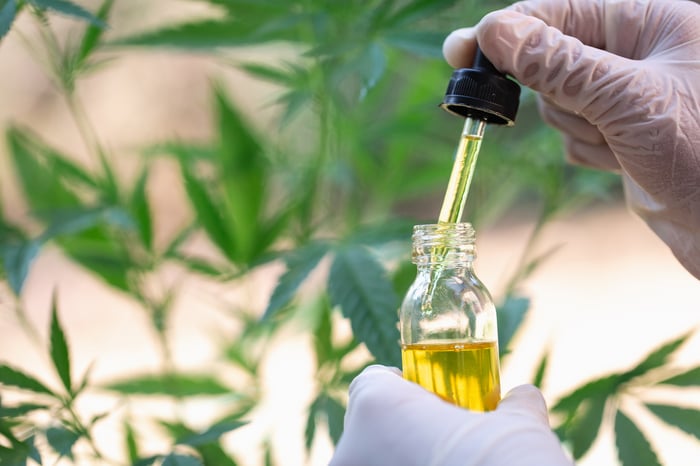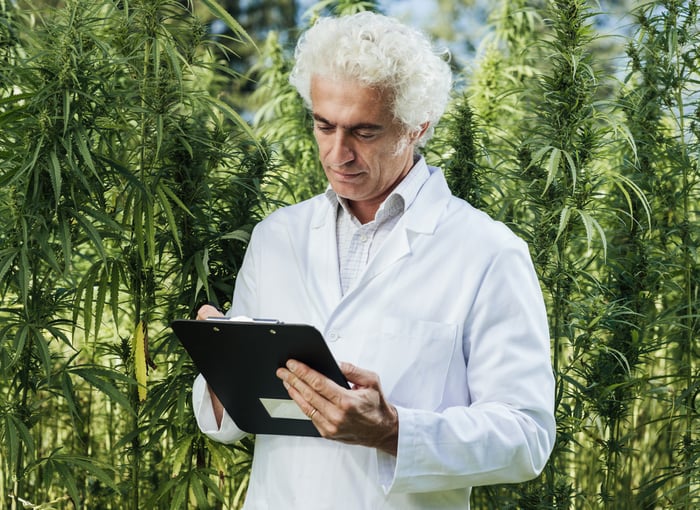Despite its growing pains, cannabis projects as one of the fastest growing industries in the world over the next decade. With sales having already more than tripled between 2014 and 2018, various estimates suggest another quadrupling in worldwide weed revenue by 2024. With a massive black market that totals tens of billions of dollars in annual sales, demand is certainly not in question.
But this growth is being derived by more than just growers. There are a number of ancillary players and niche trends at work that have the full attention of investors -- and cannabidiol might be at the top of the list.

Image source: Getty Images.
CBD sales are expected to skyrocket in the U.S.
Cannabidiol, or CBD, is one of the two best-known cannabinoids, along with tetrahydrocannabinol (THC), that can be found in cannabis and hemp plants. While THC is the psychoactive cannabinoid, CBD is the cannabinoid that doesn't get users high and is best known for its perceived medical benefits. This instantly gives CBD a broader prospective audience than THC-infused products.
Just how big of an opportunity is CBD? According to an independent report from the Brightfield Group, U.S. CBD sales are expected to grow from around $600 million in 2018 to $23.7 billion by 2023. That's a compound annual growth rate of more than 100%, if this estimate proves accurate. That's more than enough growth to attract Canadian growers and U.S. pot stocks to this niche trend.
What's more, CBD sales were given a green light in December 2018, when President Trump signed the Farm Bill into law. This legislation legalized the industrial production of hemp, as well as CBD derived from hemp, as long as it doesn't contain any THC. This gives general retail stores the right to sell CBD products, further broadening their appeal.
However, the pathway to big-time growth for CBD isn't without its hurdles, and none looms larger than the U.S. Food and Drug Administration (FDA).

Image source: Getty Images.
Former FDA head Scott Gottlieb tells a worrisome tale about CBD
You see, while hemp-based CBD may have been given a pretty clear sales pathway across the country with the Farm Bill becoming law, adding CBD, a cannabinoid that can be found in marijuana, a still federally illicit substance, to food, beverages, or dietary supplements is still a big no-no. That puts CBD regulation as an additive squarely on the plate of the FDA.
For its part, the FDA was expected to report on the progress of its discussions by the late summer or early fall, according to September tweets from acting Chief Information Officer Amy Abernethy. It's now November, and the FDA hasn't provided any updates on where its thinking is headed with regard to CBD being used as an additive.
Nevertheless, this hasn't stopped former FDA commissioner, Scott Gottlieb, who stepped down from his post earlier this year, from weighing in on CBD. Gottlieb, in series of tweets, made his opinion crystal clear about CBD:
Safety must be the first principle. And appropriate claims grounded in science. CBD is not safe and has largely unproven benefits outside a small subset of very carefully studied indications. The vast majority of claims being made by illegal producers will never be substantiated.
— Scott Gottlieb, MD (@ScottGottliebMD) November 8, 2019
Stating that "CBD hype has outpaced science" and that "CBD is not safe," Gottlieb calls on the FDA to begin its regulation by targeting dietary supplements. He proposes that the FDA require supplement producers to prove the safety and/or efficacy of CBD at very low levels, while the FDA also oversees the production, quality, and purity levels of CBD products. All non-compliant producers, or those who fail to meet rigorous purity and quality standards, should be removed from the marketplace.
Furthermore, back in March, while still head of the FDA, Gottlieb opined at a Brookings Institution event that it typically take two to three years for the FDA to develop a regulatory framework for adding a new substance into the food supply. But because cannabis is illicit, and CBD far more complex than conventional additives, it could take the agency even longer to develop regulations and a safety profile for CBD.
The U.S. CBD growth story may not be as robust as first implied
Although Gottlieb doesn't head the FDA anymore, it's his proactive policies that have shaped the agency into what it is today. When he suggests that it could be a long time before a framework is developed for CBD as an additive, I believe it's best to take him at his word. This leaves the U.S. CBD industry in a potentially precarious position.

Image source: Getty Images.
On one hand, established hemp-based CBD product manufacturers with a focus on oils and topicals should be in prime position to deliver sustainable sales growth. Despite the highly diverse space, Charlotte's Web (CWBHF -5.65%) has the clear market share lead among CBD manufacturers. Charlotte's Web has more than doubled its retail presence in 2019 from 3,680 retailers to over 8,000 doors, landing a 1,350-store deal in 22 states with Kroger, and a more recent 738-store deal with Vitamin Shoppe. This budding retail presence and the company's strong branding have allowed Charlotte's Web to push into profitability a lot quicker than other cannabis stocks.
On the other side of the coin, it means that CBD stocks are going to have to walk on eggshells to avoid crossing the FDA's radar. Curaleaf Holdings (CURLF 2.02%) learned this firsthand in July, when it received a warning letter from the FDA for making unsubstantiated health claims for some of its CBD products. Even with Curaleaf CEO Joseph Lusardi acting quickly to remove any noncompliant statements on its social media page and website, the company wound up a loser, with CVS Health announcing that it would drop some of the company's products from its stores. Chances are that as long as the FDA continues to weigh CBD as an additive, there will be more Curaleafs out there that draw the ire of the FDA.
This makes investing in the high-growth U.S. CBD industry a potentially tricky venture that'll require plenty of investor patience and a long-term outlook.





